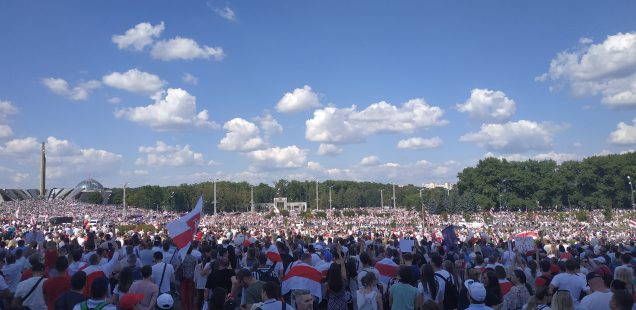
Regime Change in Belarus?
Something is changing in Belarus. When on August 16 over 200,000 people took part in the “March for Freedom” in Minsk, triggered by the fraudulent presidential election, this was most likely the largest political event Belarus has seen since 1991. One week later the mobilisation has escalated even more. Sunday (August 23) yet again saw large rallies all over the country, the most voluminous in the capital. It is certainly not the first time the Belarusians citizens’ votes were stolen. In fact, none of the elections held since 1994, when Lukashenka came to power, have been deemed free and fair. Usually, however, the vast majority are known to just shrug their shoulders at what is seen as a more or less hopeless situation. People are not particularly fond of Lukashenka, but since they do not see the ‘traditional’ opposition as a serious alternative, his rule has been accepted as a necessary evil. This time turned out to be different. Somehow Svitlana Tsikhanauskaya, a 37-year old housewife, previously an English teacher with no political experience, managed to get ordinary, notoriously apolitical, Belarusians to the streets to openly show their desire for change – to protest against President Alexander Lukashenka’s rule and the autocratic regime that he represents. The question that arises is how did this happen?
The Impact of the COVID-19 Pandemic
One major explanation is Lukashenka completely misjudged the situation when he decided to go ahead with the election in the midst of the Covid-19 crisis. To save an already suffering economy, Belarusian leaders chose to keep society open during the pandemic. The President openly showed he did not take the virus seriously. He referred to it as a “psychosis” and recommended his constituents to drink vodka, visit saunas, and drive a tractor to stay healthy. Despite this, the number of cases increased dramatically and resources for health care and other important societal functions were, as in many other countries, heavily strained. The fact the state seemingly ignored the serious situation was not taken lightly by its population. The last straw for many was when Lukashenka insisted on allowing 3,000 soldiers, including many elderly war veterans, to march through Minsk to celebrate the 75th anniversary of the fall of Nazi Germany. Carrying out this event in the midst of the pandemic was seen as a sign the President cared more about his own prestige than about protecting innocent vulnerable old people. Many Belarusians felt the state had broken the “social contract” by putting its head in the sand and letting individuals take responsibility for their own and others’ well-being. At the civil society level a number of successful campaigns were launched to support those who fought the virus. The widespread mobilization mood, combined with a general frustration about how the Covid-19 crisis was handled, translated into an unusually active election campaign and became the catalyst for the massive protests we see today.
Opposition With a New Face
Another reason for the unusual electoral developments is for once people felt there was an alternative to Lukashenka. As potential candidates Babaryka, former CEO of Belgazprombank, and the previous Ambassador to the US Tsapkala were perceived as part of the political establishment rather than the ‘opposition’ they became the most convincing opponents to Lukashenka’s rule in a long time. However, perhaps because of this, their candidacies were not officially registered. Instead, it was Svitlana Tsichanouskaja who became the candidate who made the notoriously apolitical Belarusians take to the streets and openly demand change. Ever since she “took over” the election campaign from her husband, the popular blogger Syarhei Tsikhanousky who was imprisoned in May, she met with extraordinarily support and commitment, but it was when she, Babaryka, and Tsapkala merged their election campaigns the real success story began. For the first time ever people across the country, not just in Minsk, became involved in the political process. A large cross-section of the population went to election rallies, they shared their political views on social media and, most importantly, they ultimately voted for Tsikhanouskaya. The fact that she clearly received a large percentage of their vote is also what motivated people to recognize the electoral fraud this time and actively participate in the subsequent protests.
A Colorful Revolution in Belarus?
What is happening in Belarus in many ways resembles the color revolutions in other post-Soviet states where enormous protests demanded, and achieved, the resignation of an autocratic regime no longer accepted by the population. The outcome of the Belarusian uprising is, of course, not yet known. Although it has not yet been assigned a color the red and white flag Lukashenka banned in 1995 has become the symbol of the uprising. Still, it is more often referred to as the “flip-flop” or “cockroach” revolution. The background is the interview published on Syarhei Tsikhanousky’s YouTube channel where an angry lady compared Lukashenka to a cockroach, and stated the only way to get rid of such pests was to slap them with a flip flop!
Despite the massive resistance he faces Lukashenka is not leaving his post without a fight. Although the relations between Russia and Belarus have been deteriorating the past year there is an overhanging risk Russia would decide to get involved and provide the force necessary for Lukashenka to stay in power. Such a development would completely ruin any credibility Putin and Lukashenka have amongst the Belarusians, but he would none the less survive this crisis of government. Moreover, Tsikhanouskaya has explicitly said she does not want to become president. Her goal is to ensure her husband is released from prison and that free elections are announced as soon as possible. Those who voted for her voted for change and against Lukashenka and his autocracy rather than for her as president. The protests against the election result have apparently been generated at grassroots level and have been clearly leaderless. So far, neither Tsikhanauskaya nor any of the other women who were at the forefront of her campaign have tried to lead the uprising. As it is in fact unclear what type of organization she has behind her, the question about who would run the country if she actually was to become president has yet to be answered.
Five Factors in Favour of a Regime Change
Comparing the current situation in Belarus to other countries in post-socialist Europe and the way authoritarian regimes were ousted out, several factors make a regime change more likely than ever: Firstly, over the last days, cracks have appeared within the Belarusian regime of Lukashenka. This might not affect the inner circle of his clique but the emergence of critical voices from (former) ministers, diplomats or some journalists from state television demonstrates how vulnerable the regime is and have already led to small commitments by the president. Secondly, the presence of a credible opposition, generated by Tsikhanauskaya’s candidacy, that managed to communicate to the population via online media shows a new and unprecedented level of pluralism in Belarus. Third, the protests have been mostly very peaceful and experienced a harsh reaction from state authorities, which accelerated the erosion of the legitimacy of president Lukashenka. The number of deaths is still considerably low, especially compared the late Maidan protests in 2014, but the video tapes displaying the tragic events visualize the brutality the regime. Fourth, Lukashenka receives hardly any support by relevant states from the international community. The EU does not recognize the 2020 elections, Russia is reluctant to engage in Belarus, the USA and even China called for respect of the sovereignty of the Belarusian people. Finally, the biggest factor speaking in favour of a regime chance is the ongoing vast mobilization of the population. This creates a window of opportunity for change, gave momentum to the opposition and led to the massive increase in political participation. The new level of political efficacy, i.e. people’s belief that they can influence political affairs, that emerged around the elections is truly unique. It has not been restricted to the capital but resonated in cities, towns, and even villages, all over the country – making it the most serious threat Lukashenka´s authoritarian regime has ever faced.
Yet Lukashenka’s position remains solidly unchanged. In fact, as hundreds of thousands marched through Minsk yesterday (August 23) demanding his resignation, he made a point of being filmed getting off a helicopter near his residence wearing a bulletproof vest and holding an automatic rifle. It is hard to interpret this as anything but a willingness to fight. In conclusion, two weeks after the election neither side seem to be willing to give in and the future is hard to predict. Only one thing is certain: Belarus has already changed.


